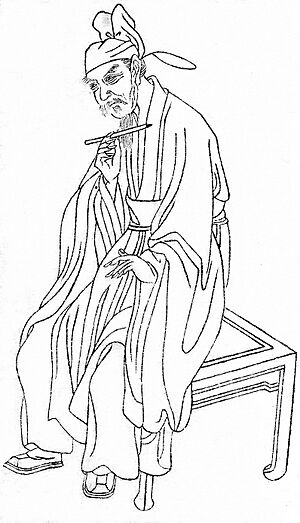Lu Jiuyuan facts for kids
Lu Jiuyuan (Chinese: 陸九淵; pinyin: Lù Jiǔyuān; 1139–1192) was an important Chinese thinker and writer. He was also known as Lu Xiangshan (陸象山; Lù Xiàngshān). Lu Jiuyuan started a major school of thought called the universal mind. This school was very important in Neo-Confucianism, which was a new way of thinking about ancient Chinese ideas. He lived at the same time as Zhu Xi, another famous philosopher, and they often disagreed.
In many parts of the world, like China, Japan, and Western countries, people know him by his special honorific name, not his private name.
Contents
Lu Jiuyuan's Main Ideas
The Mind and the Universe
Lu Jiuyuan had a very famous idea: "The universe is my mind, and my mind is the universe." This means he believed everything is connected to our minds.
Another philosopher, Zhu Xi, thought that a "principle" (called li) was the main thing that made up everything. But Lu Jiuyuan believed the heart or mind was the most important source. He thought our human mind and the mind of the universe (the Way or Dao) were actually the same.
This was different from Zhu Xi, who thought the human mind and the mind of the Way were separate. Zhu Xi also said that every single thing had its own special energy (qi). Lu Jiuyuan strongly disagreed. He taught that everything comes from and is connected to the heart/mind.
The Original Mind
The idea of the "original mind" was first talked about by Mencius, an ancient Chinese philosopher. Lu Jiuyuan took this idea and made it even stronger.
The original mind means that all people are born with a natural sense of right and wrong. We also have natural good qualities. Mencius called these the 'four roots of the heart':
- Compassion: This is the root of kindness and humanity (ren).
- Shame: This is the root of doing what is right (yi).
- Respect: This is the root of good manners and traditions (li).
- Knowledge of right and wrong: This is the root of wisdom (zhi).
Just like real plant roots, these four roots need care to grow. They are like natural tendencies of our mind. If we take good care of them, they will grow strong. Then, our true nature, which is full of good morals, can shine through.
Lu Jiuyuan believed that these good qualities are already inside us. He thought that Heaven gave us this original mind. It is the same for everyone, from wise teachers to everyday people. Its truth is always true and never changes.
How Mencius Influenced Lu
Mencius had a big impact on Lu Jiuyuan. Lu often quoted Mencius in his writings. They shared many ideas and concepts. However, Lu Jiuyuan always built on Mencius's ideas, making them deeper and more complete.
Lu Jiuyuan also learned from Buddhism and Daoism. He added some of their ideas about the universe and how things work into his own philosophy. This made Mencius's original ideas even more complex and interesting.
How Daoism Influenced Lu
Daoism also had a real effect on Lu Jiuyuan's thinking. Two main ideas from Daoism that influenced him were simplicity and spontaneity.
Spontaneity is a key idea in Daoism. It means acting naturally and without too much planning. A Daoist philosopher named Zhuangzi said, "in stillness a sage, in motion a king." This means a wise person can be calm and still, but also act perfectly when needed.
Another Daoist idea that influenced Lu Jiuyuan was about getting rid of desires. He believed that to find what is truly important, we must let go of our wants. This helps us live a simple life, free from desires that can make people lose their true, simple nature.
The School of the Universal Mind After Lu
After Lu Jiuyuan passed away in 1193, his ideas didn't have many followers in China right away. His philosophy was almost forgotten for a while.
However, a later thinker named Wang Yangming brought Lu's ideas back to life during the Ming dynasty. Wang Yangming published Lu's writings and added his own thoughts. He played a huge part in developing Lu's philosophy. The school of the universal mind then became a strong rival to Zhu Xi's school.
This school is now often called the Lu-Wang school, named after Lu Jiuyuan and Wang Yangming. In China, its influence was limited because the government controlled education. They used Zhu Xi's teachings for official exams.
But in Japan, the Lu-Wang school had a much bigger impact. This was partly because Japan's government was less centralized after the Sengoku period (Warring States period). The Oyomei school (which is the Japanese name for Wang Yangming's school) inspired many Japanese thinkers and activists, like Nakae Tōju and Ōshio Heihachirō.
Lu Jiuyuan's way of understanding Confucianism stayed important in China even into the 1900s. In the early 20th century, Liang Shuming helped make Lu's philosophy popular again with his book The Civilization and Philosophy of the East and the West (1921). A military leader named Yan Xishan even tried to bring back Confucianism in his region, following the ideas of the Lu-Wang school.
 | Misty Copeland |
 | Raven Wilkinson |
 | Debra Austin |
 | Aesha Ash |


